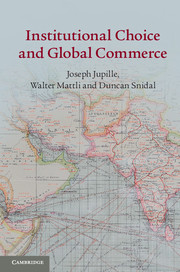Book contents
- Frontmatter
- Contents
- List of figures
- List of tables
- Acknowledgements
- Part I
- Part II
- 4 Creating the first international court of commercial dispute resolution
- 5 Commercial complexity and institutional choice in the GATT era
- 6 Institutional choice in global accounting governance
- Part III
- Bibliography
- Index
6 - Institutional choice in global accounting governance
Published online by Cambridge University Press: 05 June 2014
- Frontmatter
- Contents
- List of figures
- List of tables
- Acknowledgements
- Part I
- Part II
- 4 Creating the first international court of commercial dispute resolution
- 5 Commercial complexity and institutional choice in the GATT era
- 6 Institutional choice in global accounting governance
- Part III
- Bibliography
- Index
Summary
Introduction
The preceding chapters have focused on institutional strategies connected directly to the governance of global trade. This chapter turns to institutional choice in an area with enormous implications for trade and capital flows, namely global financial reporting. Here too our theory performs well in explaining major and sometimes surprising moments of institutional choice.
Properly designed financial reporting (or accounting) rules specify how particular types of events and assets should be reflected in the financial statements issued by firms. In other words, they are rules that firms must follow in calculating and disclosing information such as profits, costs, assets, liabilities, and revenues to their shareholders and the general public. They result in accurate descriptions of the value and financial position of firms in a manner that is easily comparable across firms.
Their significance for the smooth running of global markets in goods and services cannot be overstated. Indeed, poor financial reporting rules and their lax enforcement have been major causes of events that have imposed great costs on society, from the stock market crash of 1929 to the spectacular bankruptcies of Enron and WorldCom, and most recently, the global financial meltdown.
- Type
- Chapter
- Information
- Institutional Choice and Global Commerce , pp. 165 - 196Publisher: Cambridge University PressPrint publication year: 2013



